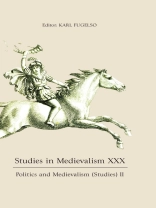Essays on the post-modern reception and interpretation of the Middle Ages,
This volume continues the theme of its predecessor, addressing how the Middle Ages have been invoked to score political points, particularly with reference to the rise of populism fueled by recent recessions and a pandemic. The nine essays in the first portion of the volume directly address political medievalism in Tariq Ali’s 2005 novel on Mideast instability,
A Sultan in Palermo; attempts by twentieth-century Czech politicians to anchor their causes in the fifteenth-century Czech hero Petr Chelcický; far-right deployment of Robin Hood memes to slander Hillary Rodham Clinton and Barack Obama; the ways Rory Mullarkey’s 2017 play
Saint George and the Dragon comments on English national identity relative to Brexit; how national stereotypes have come into play amid cross-channel reporting on Brexit; nationalism in the medievalizing German monument to their fallen at the 1942 Battle of El Alamein;the English-speaking world’s reception of Anthony Munday’s 1589 book on conduct,
Palmendos; nationalism in the self-characterization of two contemporary British Pagan movements; and how various communities in the television series
Game of Thrones comment on medieval and/or contemporary nations. Nor are politics entirely absent from the final four articles in the volume, as they examine attempts to promote such particular agendas as toxic masculinity in
Game of Thrones; misogyno-feminism there and in the George R.R. Martin book series on which the television program is based,
A Song of Ice and Fire; the potential for audience self-realization amid the tension between the individual and the collective in
The Mere Wife, Maria Dahvana Headley’s 2018 adaptation of
Beowulf; and ideal individual and collective behavior as modeled in the Ringling Brothers’ 1912-13 spectacles about Joan of Arc.
Contributors: Leticia Alvarez-Recio, Susan Aronstein, Matthias D. Berger, Shiloh Carroll, Louise D’Arcens, Laurie Finke, John C. Ford, Alexander L, Kaufman, Stephen Lahey, Scott Manning, Galit Noga-Banai, S.C. Thomson, Ethan Doyle White, Karen A. Winstead,
Tabella dei contenuti
Preface – Karl Fugelso
I: Essays on Politics and Medievalism (Studies)
Medievalism and Gulf-War Politics in Tariq Ali’s
A Sultan in Palermo – Louise D’Arcens
Czech Political Medievalism: Tomás G. Masaryk and Petr Chelcický – Stephen Lahey
Robin Hood Political Memes: Hillary Rodham Clinton, Barack Obama, and the Far Right’s Appropriation of the English Outlaw – Alexander L. Kaufman
Cry George: Grounding English National Identity in the Age of Brexit – Laurie Finke and Susan Aronstein
‘Once More into the Breach!’: Allusions to Agincourt and the Medieval Past in Cross-Channel Political Reporting of Brexit – John C. Ford
Rest in Gold: A Medieval-Like Memorial for German Soldiers at El Alamein – Galit Noga-Banai
Provenance and Reception of Iberian Chivalric Books in English from the Seventeenth to the Twentieth Century: The Case of Anthony Munday’s
Palmendos (1589) – Leticia Alvarez-Recio
In Woden’s Shadow: Anglo-Saxonism, Paganism, and Politics in Modern England – Ethan Doyle White
The West Remembers (Its Premodern Self): Nation, Civilization, and the Insular Middle Ages in
Game of Thrones – Matthias Berger
II: Other Responses to Medievalism
The Emasculation of Theon Greyjoy – Shiloh Carroll
George R. R. Martin and the Virgin Martyr: Misogyno-feminism and the (Ab)uses of the Past – Karen A Winstead
The Composite Unity of the Entangled Self in Maria Dahvana Headley’s
The Mere Wife – S.C. Thomson
Fit for Print, Not for Spectacle: Ringling Bros. and the Careful Exploitation of Joan of Arc – Scott Manning
Circa l’autore
Matthias D. Berger holds a Ph D in English from the University of Bern and is currently training to be a teacher.












